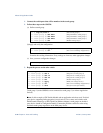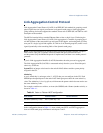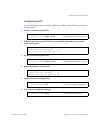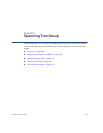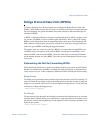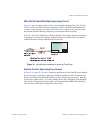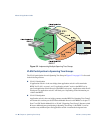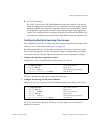
Alteon OS Application Guide
106
Chapter 5: Spanning Tree Group 42C4911, January 2007
Overview
Spanning Tree Group (STG) detects and eliminates logical loops in a bridged or switched net-
work. When multiple paths exist, Spanning Tree configures the network so that a switch uses
only the most efficient path. If that path fails, Spanning Tree automatically sets up another
active path on the network to sustain network operations.
GbESM supports IEEE 802.1d Spanning Tree Protocol. It is compatible with PVST+ by con-
figuring each STP Group in different STP instances.
NOTE – The GbESM also supports IEEE 802.1w Rapid Spanning Tree Protocol, and
IEEE 802.1s Multiple Spanning Tree Protocol. For more information, see Chapter 6,
“Rapid Spanning Tree Protocol/Multiple Spanning Tree Protocol.”
The relationship between port, trunk groups, VLANs, and Spanning Trees is shown in
Table 5-1.
NOTE – Due to Spanning Tree’s sequence of listening, learning, and forwarding or blocking,
lengthy delays may occur.
You can use Port Fast Forwarding (/cfg/port x/fastfwd/ena) to permit a port that
participates in Spanning Tree to bypass the Listening and Learning states and enter directly
into the Forwarding state. While in the Forwarding state, the port listens to the BPDUs to learn
if there is a loop and, if dictated by normal STG behavior (following priorities, and so on), the
port transitions into the Blocking state. This feature permits the GbE Switch Module to inter-
operate well within Rapid Spanning Tree networks.
Table 5-1 Ports, Trunk Groups, and VLANs
Switch Element Belongs to
Port Trunk group
or
One or more VLANs
Trunk group One or more VLANs
VLAN (non-default) One Spanning Tree group



